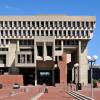This story first ran in GBH News’ politics newsletter. Click here to subscribe and get our rundown of the Massachusetts’ latest political happenings every Thursday morning straight to your inbox.
Last week, the Dorchester Reporter’s Gin Dumcius wrote about an enigmatic event at PR honcho George Regan’s home in Mashpee. The shindig was billed in an email as a fundraiser for Boston City Council President Ed Flynn and a birthday celebration for his father, former Boston Mayor and Vatican ambassador Ray Flynn. But it was also described as the rollout of a group called Save Our City, aimed at “sav[ing] … Boston from the negative impacts of the ultra-progressive policies [that] dominate the current City Council and current administration at Boston City Hall.”
When Dumcius contacted several elected officials who were slated to attend, including Ed Flynn and his at-large council colleagues Erin Murphy and Michael Flaherty, they said they didn’t know about “Save Our City” and weren’t involved in it. Regan, for his part, blamed his secretary for the email and said no “Save Our City” campaign exists, while also suggesting that he believes the city needs saving. (Boston “is not on the right path,” Regan said.)
It was a surreal bit of political slapstick — but it also thrust into the open a conversation about Boston politics that’s been simmering below the surface for months. In 2025, when Mayor Michelle Wu will be up for reelection, will she face a credible challenger? Or will she, instead, coast to a second term with only token opposition, or even no opponent at all?
My colleague Peter Kadzis, who’s been watching Boston politics for decades, doesn’t foresee Wu running unopposed, like her mentor Tom Menino did when he sought a second mayoral term back in 1997. But he doesn’t believe she’ll have to break much of a sweat, either.
“If seventy years of political history is any guide, I think Michelle Wu can safely expect to be reelected,” Kadzis said. “Whoever challenges her will probably come in somewhere in the thirty-percent vote range” — in other words, about where Tito Jackson landed in his 2017 challenge to Marty Walsh.
Kadzis believes Wu has a few advantages working in her favor, above and beyond Boston’s historic aversion to tossing out mayoral incumbents (which last happened in 1949). He sees her picks to lead the Boston Police, Boston Public Schools and Boston Fire Department — Michael Cox, Mary Skipper and Paul Burke — as strong administrators who can tamp down any trouble that might arise in their departments. And he believes the well documented travails of the Boston City Council will bolster Wu’s own standing with the electorate.
“For voters citywide, the city council is going to appear … radical or irresponsible,” Kadzis said. “And no matter how progressive Wu is, she’s going to appear to be the more sensible person.”
However, one political strategist who spoke on condition of anonymity sees the mayor as more vulnerable.
“The number of rooms I've been in where there's grumbling, whether it’s the business community or people connected to Mass. and Cass — there’s a lot of discontent out there, and it’s very likely someone will [run against her],” the strategist said. “The question is: Are you getting a top-tier candidate who can give it a real shot, or a B-level candidate who’s going to get the floor wiped with them?”
To be competitive, the strategist added, a challenger would need to have between $1 million and $1.5 million on hand to start their campaign — a high hurdle to clear, given the aforementioned invulnerability of Boston mayoral incumbents. And they'd need to be able to knit together disparate groups of voters, rather than simply catering to one aggrieved segment of the electorate.
Who, exactly, might such a candidate be? If they possess the requisite strengths, might their relationship with Wu preclude a challenge? (Before proposing two names, the strategist acknowledged that, in all likelihood, neither would ever run against Wu.) And even if this hypothetical challenger checked the requisite boxes, would their personal ambition be strong enough to pull them into a race they'd be likely to lose? Wu, we should recall, won in a landslide in 2021, beating Annissa Essaibi George 64% to 36%.
For now, of course, it’s all speculative — but we’re entering the stretch in which speculation becomes reality. If Wu does get a challenger, they will likely make it official a year to 18 months from now, and will start sending strong signals of their intentions well before then. In other words, it’s OK to stop whispering about the 2025 mayor’s race and start talking about it openly.








